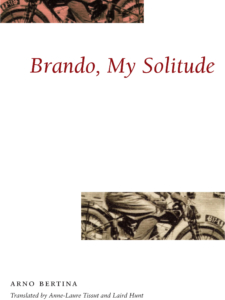Tr. from French by Anne-Laure Tissut and Laird Hunt
Shorter works always seem more poetic than longer ones. Maybe it’s for efficiency’s sake. An author with 500 pages to spread a narrative across has time to work the long con. Consider 2666, with Roberto Bolano’s story taking nearly a thousand pages to wind its way down the metaphysical sinkhole that is Benno von Archimboldi’s mysterious identity. There’s no rush. The words build like sediment, and the effect is a cumulative one, at first hardly noticeable.
At 98 pages, Brando, My Solitude, by French author Arno Bertina, doesn’t wait for you to notice a story developing around you. It begins with staccato intonations: “He’s born 1910. Has an older brother, will later have a younger brother and sister.” The tone is conversational, but pointed. It’s aggressive, yet intimate.
It’s obvious from the first few pages that what Bertina — who serves as both author and narrator — is trying to do is use everything at his disposal to reconstruct his grandfather’s identity: memory, story, fact, and wishful thinking. “As I was becoming a teenager, that is to say a serious person, he was becoming an eccentric, at 70, an inconsistent and flighty person. We missed each other,” Bertina explains. All of these tools are utilized hodge-podge, so that it is impossible to really pick apart and sift the fact from fiction.
Bertina doesn’t give you time to, anyway. The book moves at a clip, in a wonderfully strange language, both highly energized and highly poetic, which forcefully announces that you are outside the world of the banal memoir. The sentences are oddly constructed, the words deeply estranged from mundane language. Descriptions meander around strange metaphors. Incandescent images pop and disappear. The way in which the grandfather’s life is remembered mirrors the enigmatic way in which he lived:
The body he inherited grows rounder, slips under. The force of habit builds so many low walls, as difficult to get past as real walls, or to step over as emptiness.
The narrator tries to ensnare his grandfather in prose just as tenaciously as his grandfather attempts to transcend himself.
Bertina’s grandfather is elusive in the way that only people to whom you are genetically connected can be. The major movements of his grandfather’s life are known to the family: the war, his government service in colonial French Africa, the scandal of an interracial love, his various quirks and his personal failings, and his eventual return to his native country where he fails to adapt and drifts into a pattern of eccentricities. Each new summit of strangeness that he achieves as an elderly man, be it going out in a bed sheet toga or insisting that empty church pews are actually full, is explained as his mental space having “further expanded.” So as the narrator tries to hunt him down, the barrier separating them isn’t just time, it’s also dementia, which the narrator is forced to interpret in order to make some sort of sense of his grandfather.
The Brando of the title is, by turns, obvious, then obscure. The grandfather finds Marlon Brando late in life, discovering in the actor’s seductive sadness a sort of double for his own alienation from his family and his country. He asks about buying a VCR to watch Brando’s movies. He broods on the actor, finding in Brando’s “feminine” solitude his own desire to be completely alone. Another one of his autumn eccentricities was learning Russian, in which he makes the note that:
One should understand solitude in the way that madness was understood in the XVIII century, in a park. I did not write “My madness is named Brando” but “My solitude is named Brando.” My solitude needs to be transported back to the XVIII century, in a park. Some mystics withdrew to the desert. The Port Royal de Champs desert, for instance, in the Chevreuse valley. I wrote “My solitude is named Brando” but one should read solitude the way desert was read in the XVIII century, and madness too.
The grandfather is doing to the actor what the author is doing to the grandfather: using sparse evidence and random clues to build an identity for a stranger, then using prose to fuse that identity to his own.
Literature doesn’t necessarily have an obligation to do anything. Regardless, books wind up filling unexpected roles. This wonderfully cryptic novel, a work put out by Counterpath, a press/bookstore/performance space in Denver, ends up doing a few things.
First, it’s a pretty accurate description of eccentricity, especially of eccentrics in our own family. It often happens in the elderly, veterans, or the dying, that mortality gives people the impetus — the courage really — to aspire to more uninhibited versions of themselves. As odd as these people may become, it almost seems like a right that they’ve earned through the accumulation of so many painful experiences.
Secondly, the book is an attempt to reconstruct a man in full. Using memory, stories, conjecture, documents, and fiction, the narrator tries to cobble together a person. You can say all the obvious things about the impossibility of ever really knowing someone — of our futile attempts at real intimacy — but you come away from this book not with a depressing sense of failure, but with awe that we even have a desire to try.
This post may contain affiliate links.









